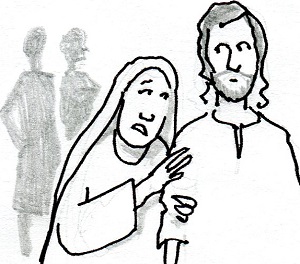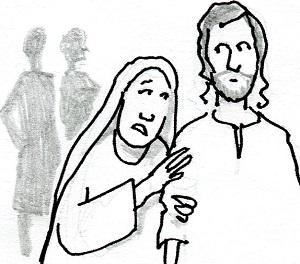

“It shall not be so among you” (Matthew 20:28).
Jer 18:18-20; Matt 20:17-28
We are familiar with the steady effort of Jesus’ enemies to oppose his ministry, but perhaps the greater threat came from within. His own disciples were undermining the vision he had for them as the beloved community.
Today’s first reading sets the theme for the prophet Jeremiah, who faced threats by his contemporaries because they did not like his warnings. They dumped him in a muddy cistern to starve to death. He was called “a man of constant sorrow” and even felt betrayed by God.
Still, we imagine Jesus’ consternation to realize that his own disciples are vying for positions of importance and quarreling on the road over which of them is the greatest. They have tasted the glory of being his assistants during his ministry of miracles in Galilee, and they see themselves sitting on thrones when he is proclaimed the messiah in Jerusalem. Jesus tries to prepare them for the rejection and suffering he will face there, but they ignore his predictions. He chose them to carry forward his mission after his death, but they totally misunderstand everything he has taught them.
It all comes to a head when two of his disciples, James and John, put their own mother up to asking Jesus to make them his chief lieutenants when he enters his glory. When the others get wind of this end run, they erupt with resentment over the ambitious jockeying they are all engaged in to be first. Didn’t he just tell them he was going to be mocked, scourged and crucified? Jesus halts them on the road and begins again to tell them that they must be different than those who lord it over others. He is about service and self-sacrifice, not power and control.
We know from the rest of the story that Jesus will go to the cross abandoned, betrayed and denied by his closest disciples. Jeremiah will prove to be a pale foreshadowing of the loneliness and suffering of Jesus. It will take his death to break their spell of personal glory and begin to make them see and accept the paradox of his failure as the key to the victory of his love over hatred, humility over pride, service over selfishness.
Many of Jesus’ teachings and parables were about reversals that become turning points in our lives. If we can surrender to them, we encounter God’s mysterious love. A sower scatters most of the seed to birds, rocks, sun and thorns, then reaps a generous harvest in good soil. A woman loses something precious, then searches the house until she finds it. A shepherd pursues one lost sheep. A father loves home a wayward son. A wedding couple runs out of wine, learns that the best is saved for last. We discover grace at work in adversity. Jesus patiently teaches us through these paradoxes that only the brokenhearted really see the hidden face of God.
Advertisement




